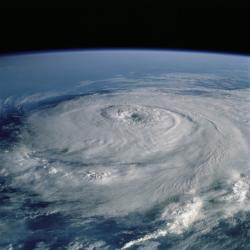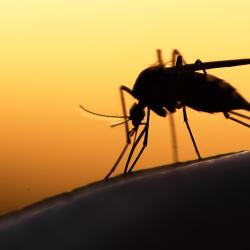Climate Change May Sharply Reduce U.S. Agriculture Output by 2050, New Model Warns
Researchers urge new agricultural policies and research priorities to prevent productivity loss
If climate change is not addressed, agricultural production in the United States could fall to pre-1980 levels by the year 2050, according to a new study.
 A group led by University of Maryland researchers modeled the effects of climate change on agriculture and found that variations in temperature and rainfall accounted for about 70 percent of year-to-year variance in agricultural productivity from 1981 to 2010 in the United States. If climate change continues as projected, the model shows that productivity could enter a continuous decline starting around the year 2025.
A group led by University of Maryland researchers modeled the effects of climate change on agriculture and found that variations in temperature and rainfall accounted for about 70 percent of year-to-year variance in agricultural productivity from 1981 to 2010 in the United States. If climate change continues as projected, the model shows that productivity could enter a continuous decline starting around the year 2025.
The work was published in the Proceedings of the National Academy of Sciences on March 6, 2017.
“This level of decreased productivity would drastically alter the U.S. agricultural economy, affecting not only the price and availability of food in the U.S., but also the international trade balance,” said Xin-Zhong Liang, a professor of atmospheric and oceanic science at UMD with an appointment in the Earth System Science Interdisciplinary Center, who is the lead author of the research paper.
Previous efforts to discover links between climate and agricultural productivity have focused on short-term, local effects. For instance, other researchers have studied the impact of severe weather events on crop yields. These studies were limited to local climate effects, specific agricultural products or short time scales. In contrast, Liang and his colleagues looked at multi-decade, nationwide data.
Climate is not the only factor that affects agricultural output. Technological advances and changes to public policy, such as incentives and subsidies, also influence productivity. According to the model developed by Liang and his colleagues, technological improvements have created gains that, so far, have outweighed productivity loss from climate.
However, when the researchers input future climate data into their model, using scenarios developed by the Intergovernmental Panel on Climate Change, they found that climate-related losses would overwhelm technological gains by around the year 2035. According to the researchers, the rate of technological advances would need to double in order to sustain U.S. agricultural productivity at its current level.
“Our results suggest an urgent need for the U.S. to adopt agricultural and research policies that promote both adaptation and technological advances, in order to maintain the current levels of agricultural productivity,” Liang said. “Without such efforts, it will be difficult to meet the needs of the growing global population, which is projected to require roughly double the current amount of food by 2050.”
Liang said that climate effects will not be limited to the agricultural economy, but will cascade through other related systems as well.
“The decreases in agricultural productivity that we project here will drive changes in production choices—for example, farmers in heavily affected regions may reallocate their land to other purposes, while farmers in less-affected regions may intensify planting,” Liang said. “This in turn will affect diverse factors such as water availability and quality, the viability of alternative bioenergy sources and even the climate system itself.”
The researchers note that, in the future, new policies may help limit climate change impacts. Developing such policies depends, in part, on a more complete understanding of the connections between climate and agriculture.
“It is imperative that we increase our understanding of these systems so that we can develop better projections and resources for policymaking,” Liang said. “This research is a first step in an ongoing National Science Foundation-funded project aiming to better understand the diverse interactions between different systems within the food, energy and water nexus in a changing climate.”
###
This research was supported by the U.S. Department of Agriculture (USDA) UV-B Monitoring and Research Program (Grant USDA National Institute of Food and Agriculture Projects 2013-34263-20931, 2014-34263-22038 and 2015-34263-24070), and National Science Foundation Innovations at the Nexus of Food, Energy and Water Systems (Grant EAR-1639327). The content of this article does not necessarily reflect the views of these organizations.
The research paper, “Determining Climate Effects on U.S. Total Agricultural Productivity,” Xin-Zhong Liang, You Wu, Robert Chambers, Daniel Schmoldt, Wei Gao, Chaoshun Liu, Yan-An Liu, Chao Sun and Jennifer Kennedy was published in the journal PNAS on March 6, 2017.







